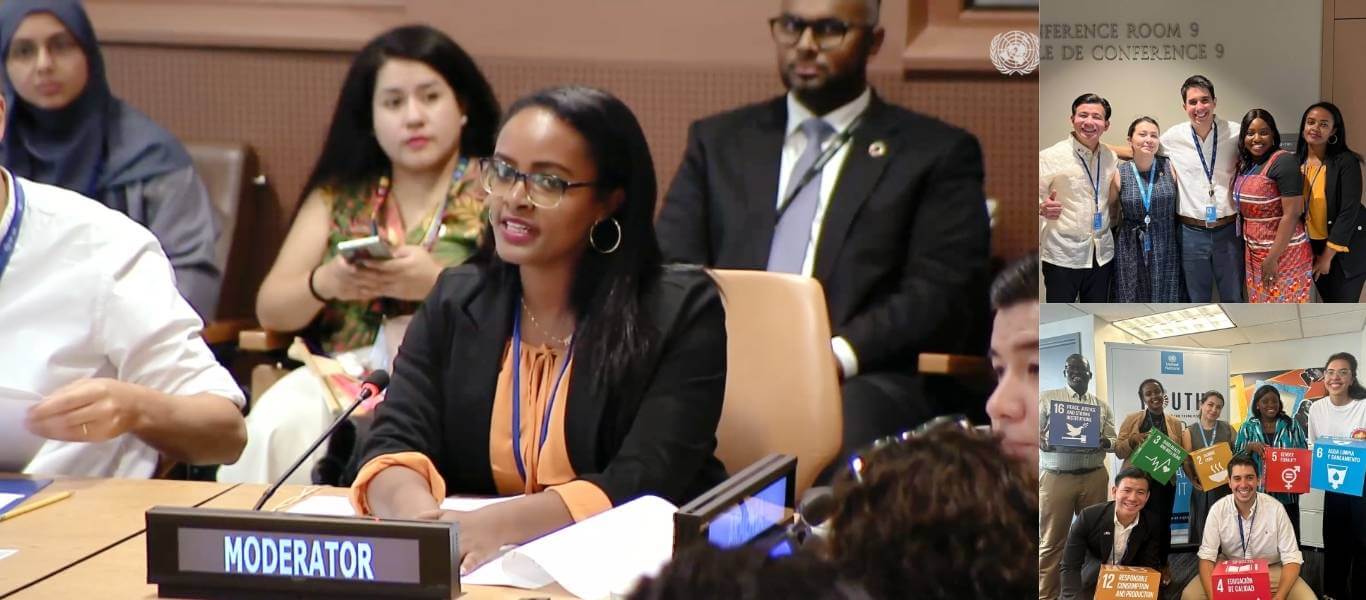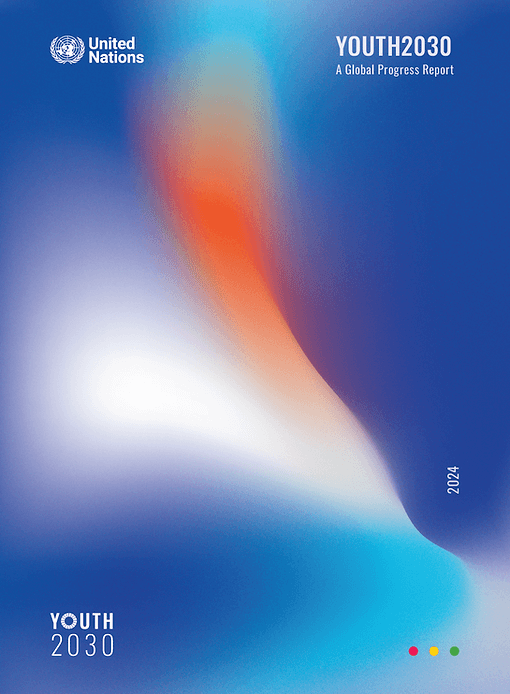TaYA at UN High-Level Forum 2024:
Unveiling the Youth2030 Progress Report

Communications Team | August 8, 2024
The 12th session of the High-Level Political Forum (HLPF) was held under the auspices of the UN Economic and Social Council from July 8 – 17, 2024. The HLPF is the main UN platform with a central role in the follow-up and review of the implementation of the 2030 agenda for sustainable development and its SDGs. This year’s theme was “Reinforcing the 2030 Agenda and Eradicating Poverty in Times of Multiple Crises: The Effective Delivery of Sustainable, Resilient and Innovative Solutions”.
There was an in-depth review of the selected SDGs: SDG 1 (End poverty), SDG 2 (End hunger), SDG 13 (Take urgent action to combat climate change), SDG 16 (Promote peaceful and inclusive societies for sustainable development), and SDG 17 (Global partnership).
TaYA, represented by Lulit Yonas, attended the following sessions/meetings/event at the margins of HLPF 2024.
-
- Informal meeting with Felipe Paulier – head of the UN Youth Office/Assistant Secretary-General on Youth Affairs.
- Partnerships that work; cooperation on youth skills for youth-led SDGs achievement – a side event organized by the permanent mission of Germany to the UN.
- Expert level meeting on Peace Building Architecture – Youth. Education and Peace-building – hearings from youth and CSO representatives across different countries in Africa, Asia, Europe, and Latin America on their experiences, good practices, and lessons learned regarding the role of education in peace-building.
- Informal meeting with UNDP youth program team meeting – to discuss potential collaboration at the country level in youth-led climate change and peace-building activities.
- UN Girls’ Education Initiative’s young feminists’ solidarity circle – a brave feminist space to connect and learn about each other’s work as well as share best practices and reflections on works on gender equality, education, and youth activism and their intersections.
The main reason for TaYA’s participation at this forum was to moderate the launch of the progress report of the Youth2030 strategy. The UN Youth Office co-organized this side event in the UN Headquarters with The Permanent Mission of Cyprus to the UN, The Permanent Mission of Mexico to the UN, the Major Group for Children and Youth, The International Coordination Meeting of Youth Organizations, and Young UN. The objective of this side event was to mark the launch of this year’s progress report, outline the vision for the next six years of Youth2030 and provide recommendations on the way forward to rejuvenate the UN’s workforce.
The event was opened by the Assistant Secretary-General reading the written statement from the UN’s Secretary General, Antonio Guterres which provided a foreword to 2024’s Youth2030 progress report. The statement remarked that as the world is at a crossroads facing existential threats such as conflicts, climate crisis, and deepening inequalities, young people are leading the charge for urgent action to combat these threats. Highlighting the need for the UN to lead by example, the Secretary General committed to stand by young people speaking out and working for real change. Following that, the Assistant Secretary-General introduced the live dashboard and the 4th progress report of the Youth 2030.
Youth2030: A Global Progress Report, 2024
The Youth2030 strategy has two main objectives, and the progress report highlights progress and challenges at the global, regional, and local levels in terms of these two main objectives:
-
- To address the needs, to build the agency, and to advance the rights of young people in all their diversities.
- To ensure young people’s engagement and participation in the implementation, review, and follow-up of the 2030 agenda.

The Youth2030 dashboard measures progress with a set of Key Performance Indicators with scorecards among UN entities and counties. The live dashboard, which is publicly available provides detailed information.
The Youth2030 dashboard measures progress with a set of Key Performance Indicators with scorecards among UN entities and counties. The live dashboard, which is publicly available provides detailed information.
According to the findings, there are UN entities and countries that are leading by example and some that have made acceleration in the reporting cycle (Jan – Dec 2023). The progress report highlights four concrete findings:
-
-
Good progress in advancing the SDGs with youth at the center.
-
Support to governments remains a key area of the work of the UN system on youth particularly regarding strengthening national programs and policies on youth and mainstreaming youth issues in sectoral policies.
-
Focus on youth within the UN strategic planning processes at the entity and the country levels across various work streams such as programming, HR, communication, and advocacy -enhanced alignment with the objective of Youth 2030.
-
Surge in youth engagement across UN entities and UN country teams.
-
UNCT SNAPSHOT SERIES
UN Country Teams UNCTs Snapshot Series
The progress report noted that engagement with diverse youth groups has improved at all levels. There is 10 times increase in youth engagement in UN Sustainable Development cooperation frameworks at country levels (7 – 17% from 2020 to 2024). However, there is a long way to go to achieve the Youth2030 recommendation and acceleration is needed.
Following the independent analysis that was conducted to understand what was working and what was not as well as what could be improved, the following recommendations were laid out:
-
-
Boost youth 2030 alignment with global, regional, and national actions and pathways for the SDG acceleration anchored on the six key transitions (food systems, energy access and affordability, digital connectivity, education, jobs, and social protection, and climate change) with Meaningful Youth Engagement at the center.
-
Focus on internal transformation within the UN, linked with UN 2.0 (the SG’s initiative) with the rejuvenation of the UN workforce and forward-thinking culture.
-
Revamp Youth2030 global governance structures by expanding to the Youth2030 high-level Steering Committee and joint Working Group anchored in the new UN youth office – the main structures that drive system-wide collaboration, coordination, and accountability on the strategy implementation.
-
Prioritize high-level political engagement and UN leadership engagement of champions that can voice their concerns directly and be part of a genuine intergenerational and multisectoral allyship.
-
-
- Document: Youth 2030 Progress Report
- Web: High-Level Political Forum on Sustainable Development
- Video, UN Web TV [External]: Youth-Powered Sustainable Development Goals (HLPF 2024 Side Event)
- Dashboard [External]: Youth 2030 Progress
